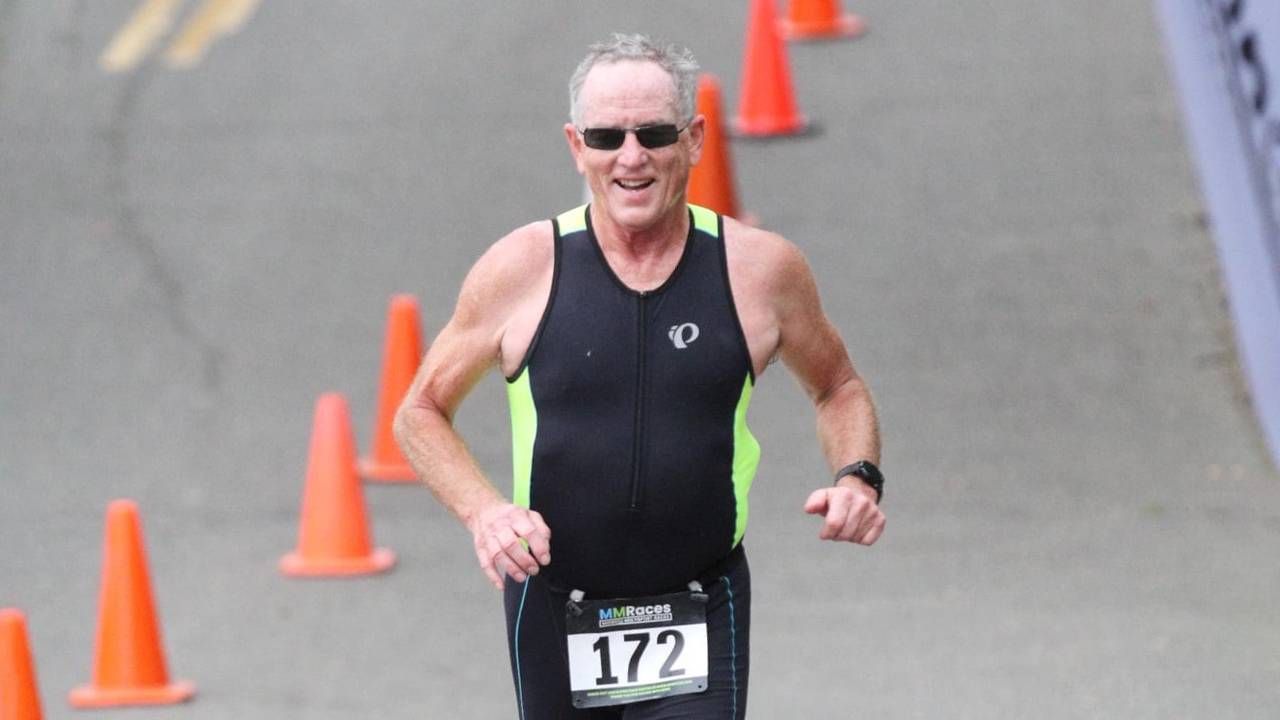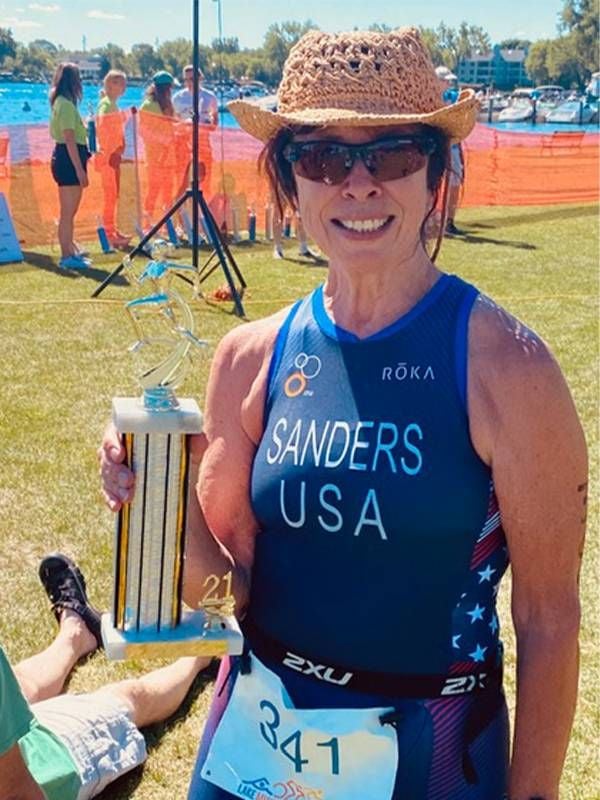The Perfect Time to Tri
Triathlon is a grueling sport. Why is it so popular with the over-50 set?
If someone asked you to name some lifetime sports, you'd probably list golf, tennis, hiking, nordic skiing or pickleball. What probably wouldn't jump to mind, is the grueling swim-bike-run of triathlon. That's why we were surprised to learn that a high percentage of triathletes — as many as half of participants in some races — are over 50.

The standard triathlon, referred to as an Olympic triathlon, is a .93 mile swim, a 24.8 mile bike ride and a 6.2 mile run. A Sprint triathlon features a half-mile swim, a 15-mile bike ride and a 3.1 mile run, or a 5K. There are Ironman versions with longer distances.
To find out why this sport is so popular among active middle aged and older adults, we talked to a race director, two longtime triathletes and a triathlete-and-coach-turned-podcaster. After reading their inspirational tales, you might agree that after 50 is the perfect time to tri.
The Wide Appeal of Triathlon
In 2016, the latest year in which USA Triathlon published its member survey, nearly one-third of responding members in the elite level organization were over 50. In fact, the age group with the highest membership was athletes aged 45 to 49, a jump of two age groups since the prior survey in 2009.
At the regional level, triathlon appeals to many recreational athletes over 50 as well, according to Judi Fluger, founder and director of Midwest Multisport Races, LLC, based out of White Bear Lake, Minn.
The fact that triathlon is such a tough sport is a big part of its appeal.
"I've been a race coordinator for close to twenty years," Fluger said, "and as far as participation by people over fifty, that's where a big percentage of racers are."
Fluger, who, at 61 not only coordinates races but still competes, points to a couple of reasons for this.
"The equipment can get pretty expensive, and people over 50 tend to be able to afford that better," she said. Also, people over 50 generally have more time to train, once the kids have left the nest and careers are well-established.
That was the case for Michel Sanders, a 68-year-old retired biochemistry professor from St. Paul, Minn.
"When my daughter went off to college, I had more time on my hands, and a friend was doing triathlons," she said.
Sanders went and watched one, then trained and competed the following year. "I got hooked," she said. "I was fifty-six at the time." Since then, Sanders estimates that she's done about 150 triathlons.
Up to the Triathlon Challenge
The fact that triathlon is such a tough sport is a big part of its appeal, according to the people we interviewed.
Helen Murray, a top-level age group triathlete, coach and host of the popular Inside Tri Show podcast out of Wrexham, Wales, has interviewed dozens of athletes and said, "One of the draws is that it is a challenge. It takes you out of your comfort zone and makes you question your boundaries and limits."
Tom Couillard, of White Bear Lake, Minn., agrees. "The main reason I like doing triathlons is because of the challenge. I love the competition, and most races have five-year age groups, so they accommodate everyone."
Couillard, who is 72, completed 38 races in 2021, nine of which were triathlons.
There is Joy in Shared Suffering
Camaraderie is the other big reason these athletes keep going back to triathlon year after year. "Triathlon is a great way to meet people who you know are going to be active, and it's a very friendly community," Sanders said.
For Couillard, having a group to train with regularly is a big part of the draw. "There's a group of us — we call ourselves the Rebels — who meet to run together every Tuesday, Thursday and Saturday," he said.

Couillard particularly loves swapping stories of tough training workouts and race day adventures over the coffee break following a long weekend bike ride or run.
Sanders said it was tough to stay motivated during the COVID-19 pandemic because she did nearly all of her training alone. "It's easiest to get into a group to train with, even if it's a small group of two or three people. There's that added accountability, but it makes you want to go, too. Training becomes a chance to see your friends," she explained.
If you do find yourself training alone, listening to podcasts can be a good way to pass the time while gleaning both training tips and inspiration. In one of Murray's favorite episodes, she interviews both Sister Madonna Buder, age 91, known in triathlon as "The Iron Nun," and the legendary triathlon coach Joe Friel.
How to Get Started in Triathlon After 50
Both of the triathletes we interviewed got into the sport after 50, and Sanders says, "The fun part is, you can just start with a shorter race — the Sprints — because then the training isn't as difficult."
Murray agreed that shorter races are more approachable, and she also recommends finding other people to train with. However, because triathlon involves three different disciplines, she says, "It's important to seek guidance from a coach to set up training plans early on."
How to Keep Training Safely
When we asked how they've kept swimming, biking and running past middle age, our triathletes offered a few key tips.
"Triathlon is a great way to meet people who you know are going to be active, and it's a very friendly community."
"The main thing is to get sleep," Couillard said, "because if you don't get your sleep it's really hard to train with any intensity." Indeed, sleep may be the most important part of recovery, when the body rebuilds itself after the stress of exercise. But it's equally important not to overtrain.
"It's very easy to overtrain with three different events — it's a lot of training," Sanders said. She followed that up with a good point, however: "But because you're doing different things, you don't get injured as much as if you were only running, biking or swimming."
Drawing on her own experience and the expertise of coaches she's interviewed, Murray said, "Recovery is absolutely key. Joe Friel suggests that in a week of training, there should be five very easy days, and two days of hard workouts — so hard you're dreading them."
Everyone we spoke with also stressed the importance of strength training, especially during the off season, to maintain strength, muscle mass and bone density.
Triathlon may be tough, but for many people over 50, it has the ability to instill a sense of accomplishment and belonging unlike any other sport.
"Oh," Couillard added, "it keeps you in pretty good shape, too."


